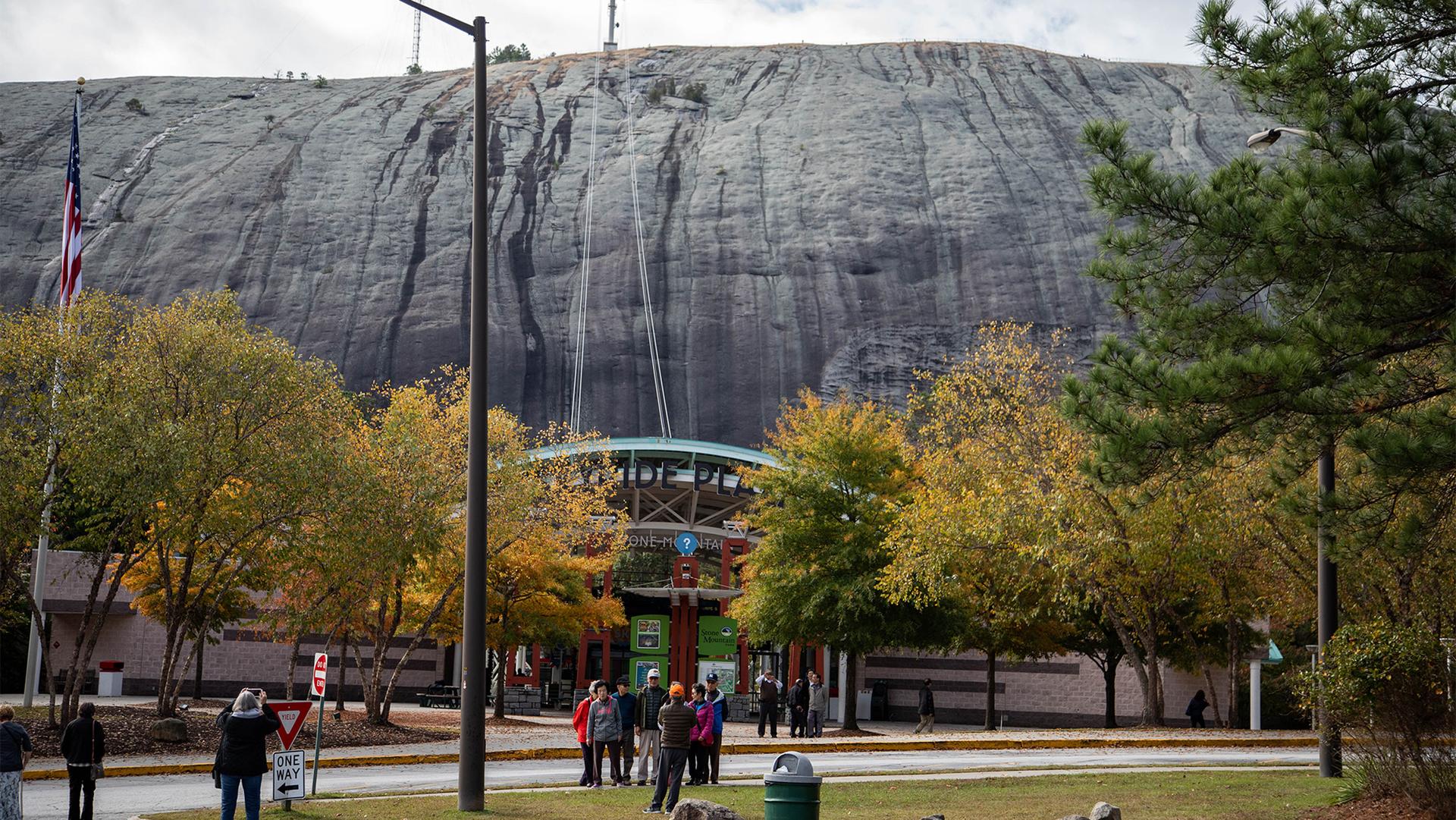The city of Stone Mountain, Georgia, about 15 miles from Atlanta, is home to the largest Confederate monument in the US — known by the same name — and often called the “Confederate Mount Rushmore.”
Stone Mountain was a gathering place for white supremacists who used to march down the city’s Main Street. Now, officials say it will be a symbolic triumph on Saturday when that same street is blocked off for Stone Mountain’s first celebration of Juneteenth, a holiday that marks the end of slavery in the US.
“I am just excited,” said Elaine Vaughn, whose family has lived in the city for three generations. “I grew up when the Klans [KKK] were here. …. You will hear the racial slurs, you would see the marches, you would see them in their attire, their gowns and hoods, burning their torches.”
Related: What impact will Latino voters have on North Carolina in the future?
Vaughn helped organize Stone Mountain’s first Juneteenth, and it will also be her first Juneteenth.
She says she’s focused on celebrating the lives of her ancestors. That’s why, as a member of the event’s planning committee, she supported a group decision that’s caused some controversy in the lead-up to the event.
The group denied one of the first applications for an official vendor table at the event — it was filed by the Stone Mountain Action Coalition, or SMAC, which wants to end taxpayer funding for Stone Mountain Park and allow the monument to be slowly covered up by vines and lichen.
Vaughn said organizers didn’t want that conversation to overshadow the Juneteenth holiday.
“People must realize that is a private mountain that really [doesn’t] have a lot to do with the city here,” she said. “Set [that] aside, and let that be on the back burner. Don’t bring that to us.”
The city of Stone Mountain has no jurisdiction over the Stone Mountain Monument, which is etched into the granite side of a mountain, and depicts the president of the Confederacy, Jefferson Davis, and Confederate generals Robert E. Lee and “Stonewall” Jackson.
The Daughters of the Confederacy funded the monument, and it looms over a valley that the state of Georgia bought in 1958 to memorialize Southern history.
Some locals are pushing back on the Juneteenth planning committee’s rejection of SMAC’s vendor application.
Related: A racial slur remains in hundreds of place names throughout North America
“We want to have a conversation. We want people across Atlanta, across Georgia and across the nation to be involved.”
“Denial does not match who we are as Georgians, and we want to have a democratic process. We want to have a conversation. We want people across Atlanta, across Georgia and across the nation to be involved. And this conversation we see is liberation in the tradition of Juneteenth,” said Sally Stanhope, a nearby resident who’s part of SMAC. “And I think that’s why we’re so surprised that we were denied.”
The group that governs the monument is considering changes. But in the meantime, emotions are running high. Last August, there was a violent confrontation at the park between far-right militia members and anti-racist groups. In March, a Confederate flag rally was also met by counterprotesters. This monument still inspires white supremacists, said Derrica Williams, another SMAC member who grew up in Stone Mountain and still lives there.
“How can you celebrate Juneteenth, in its totality, without recognizing the role that places like Stone Mountain play in keeping people in bondage?” she said. “Juneteenth is about freedom, Juneteenth is about removing shackles, and there’s a big part of Stone Mountain that is kind of hell-bent on keeping shackles in place.”
Related: Author Isabel Wilkerson: Caste, not race, is the ‘bones’ of inequality in the US
Williams said Stone Mountain Park whitewashes history. In recent years, it has marketed itself as an amusement park, drawing 4 million visitors a year. Now, the three Confederate heroes loom over a valley filled with attractions, like mini-golf, a climbing wall and waterslides.
But the park’s historical markers, signage, even its nightly laser show projected onto the mountainside — all still speak of the glories of the Confederacy, without mentioning slavery. Williams said that should concern everyone, especially on Juneteenth.
“If you aren’t actively fighting against racism, then you are contributing to that problem.”
“It doesn’t make any difference what your race is,” she said. “If you aren’t actively fighting against racism, then you are contributing to that problem.”
Related: Confederate Christmas ornaments are smaller than statues — but they send the same racist message
Williams and her group are still planning to go to Stone Mountain’s Juneteenth event to hand out information. And Stone Mountain Mayor Pro Tem Chakira Johnson said they’re welcome to do that. She leads the Juneteenth event committee and also supported denying the coalition a vendor table.
“The city itself has collectively been trying to tell a story, how we are not that negative past for many years now, how we have grown into a more diverse and inclusive community. We are our separate city,” Johnson said. “We are not the park, and we are not that history.”
These days, Stone Mountain city is nearly 80% Black. Johnson said she hopes people will come out and enjoy the Juneteenth food, dancing, music, vendors and fireworks.
